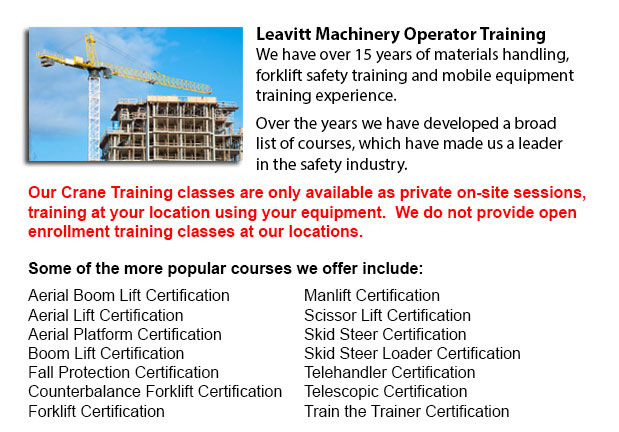
Richmond Hill Crane Training Schools - Our various programs for Mobile Crane Operation are meant for skilled operators who requires re-certification or certification, and for inexperienced people who are seeking their very first work as an operator of a crane. Industry demand for certified crane operators is high all over the country. Crane operator positions are high because of their high pay. Operators of cranes are among the highest paid of whichever operator of heavy equipment.
Our Crane Training Schools feature instruction and training for different mobile cranes. Course subject consists of Crane Set-up, Wire Rope, Lift Planning, Load Dynamics, Signaling, Load Charts and Rigging.
The Crane Training School program is best for operators, riggers and supervisors. Course materials include an informative and manual hand-outs. The illustrated safety instruction manual features one hundred to two hundred fifty pages, that depends on the course, of important and useful material. Course materials consist of load charts and load chart exercises for the crane with which the person training is working.
Over half of the course includes Hands-On Safety Training. Practical training is useful for increasing and developing personnel skills levels. Only licensed journeyman crane instructors are chosen to teach the courses. Our instructors possess many years of experience in the business.
Optional testing mechanisms are provided for all of our courses. Students would usually write tests both prior to and following training. A skills test is normally administered for programs which consist of H.O.S.T. Trainees will be tested and graded.
We offer certified training programs for the following cranes: Fixed and Swing Cab Mobile Hydraulic Cranes; Lattice Boom/Crawler Cranes; Articulated Boom/ Knuckleboom Cranes; Rigging / Signalperson Certification and Training; Testing & Certification; and In-The-Seat Training.
Business standards of practice are evolving as new business requirements emerge. There are constant updates to regulations and legislation. Enhancements in technology and equipment continue to be made. Industry data collection and analysis identify trends that are changing. Members maintain the privilege of managing their certifications and training programs. Mobile device alerts keep members ahead of personal and workplace safety news.
-
Richmond Hill Manlift Operator Training
Richmond Hill Manlift Operator Training - The aerial lift or manlift is a specialized type of hydraulic platform that is meant to lift an individual vertically giving it an alternate name of a vertical personnel lift. These machines are widely used f... More -
Richmond Hill Boom Lift Training
Richmond Hill Boom Lift Training - Aerial platforms or likewise known as elevated work platforms are devices that enable workers to perform tasks and duties at elevated heights which would not be otherwise accessible. There are a variety of aerial li... More -
Richmond Hill Overhead Crane Safety Training
Richmond Hill Overhead Crane Safety Training - Overhead crane safety training equips operators with knowledge and skills about crane safety measures, accident avoidance, materials handling, and machinery and stock protection. Trainees will learn the... More -
Richmond Hill Heavy Equipment License
Richmond Hill Heavy Equipment License - A heavy equipment license could be acquired by taking a certification and preparation course at a private training school or a vocational school. This license would qualify you to operate many kinds of heavy ma... More -
Richmond Hill Manlift Training
Richmond Hill Manlift Training - Various manlift training programs consist of the review and content of manlift devices. An important part of the program is the practicum where students show their knowledge and practical ability to safely operate a m... More -
Aerial Lift / Boom Lift / Man Lift / Scissor Lift Training in Richmond Hill
Scissor platform lifts are forklift tables that elevate things and individuals and goods vertically. They are often used in industrial, construction and commercial environments. A common use of scissor platform lifts is for lowering or lifting constr... More -
Richmond Hill Scissor Lift Safety Training
Richmond Hill Scissor Lift Safety Training - A scissor lift is a kind of platform lift that moves vertically. The lift table is moved in a vertical motion because of criss-cross folding supports which are linked in what is known as a pantograph. The... More -
Richmond Hill Heavy Equipment Training
Richmond Hill Heavy Equipment Training - The two most common types of heavy equipment training are classed into the categories of equipment; machines which is fashioned with tracks and those with rubber tires. The tracked vehicle are heavy duty machi... More

Forklift Certification Richmond Hill
TOLL FREE: 1-888-254-6157
Richmond Hill, Ontario
forkliftcertificationrichmondhill.com
Email Us
About Us


